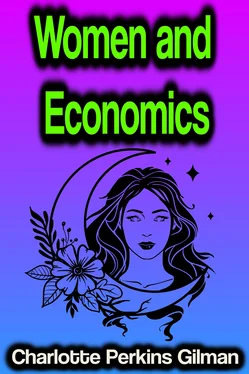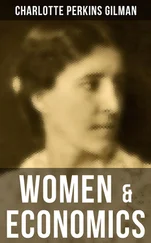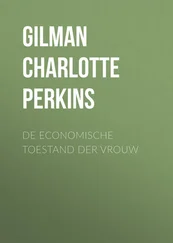It is revolting so to consider them; and, if we dare face our own thoughts, and force them to their logical conclusion, we shall see that nothing could be more repugnant to human feeling, or more socially and individually injurious, than to make motherhood a trade. Driven off these alleged grounds of women's economic independence; shown that women, as a class, neither produce nor distribute wealth; that women, as individuals, labor mainly as house servants, are not paid as such, and would not be satisfied with such an economic status if they were so paid; that wives are not business partners or co-producers of wealth with their husbands, unless they actually practise the same profession; that they are not salaried as mothers, and that it would be unspeakably degrading if they were,–what remains to those who deny that women are supported by men? This (and a most amusing position it is),–that the function of maternity unfits a woman for economic production, and, therefore, it is right that she should be supported by her husband.
The ground is taken that the human female is not economically independent, that she is fed by the male of her species. In denial of this, it is first alleged that she is economically independent,–that she does support herself by her own industry in the house. It being shown that there is no relation between the economic status of woman and the labor she performs in the home, it is then alleged that not as house servant, but as mother, does woman earn her living. It being shown that the economic status of woman bears no relation to her motherhood, either in quantity or quality, it is then alleged that motherhood renders a woman unfit for economic production, and that, therefore, it is right that she be supported by her husband. Before going farther, let us seize upon this admission,–that she is supported by her husband.
Without going into either the ethics or the necessities of the case, we have reached so much common ground: the female of genus homo is supported by the male. Whereas, in other species of animals, male and female alike graze and browse, hunt and kill, climb, swim, dig, run, and fly for their livings, in our species the female does not seek her own living in the specific activities of our race, but is fed by the male.
Now as to the alleged necessity. Because of her maternal duties, the human female is said to be unable to get her own living. As the maternal duties of other females do not unfit them for getting their own living and also the livings of their young, it would seem that the human maternal duties require the segregation of the entire energies of the mother to the service of the child during her entire adult life, or so large a proportion of them that not enough remains to devote to the individual interests of the mother.
Such a condition, did it exist, would of course excuse and justify the pitiful dependence of the human female, and her support by the male. As the queen bee, modified entirely to maternity, is supported, not by the male, to be sure, but by her co-workers, the "old maids," the barren working bees, who labor so patiently and lovingly in their branch of the maternal duties of the hive, so would the human female, modified entirely to maternity, become unfit for any other exertion, and a helpless dependant.
Is this the condition of human motherhood? Does the human mother, by her motherhood, thereby lose control of brain and body, lose power and skill and desire for any other work? Do we see before us the human race, with all its females segregated entirely to the uses of motherhood, consecrated, set apart, specially developed, spending every power of their nature on the service of their children?
We do not. We see the human mother worked far harder than a mare, laboring her life long in the service, not of her children only, but of men; husbands, brothers, fathers, whatever male relatives she has; for mother and sister also; for the church a little, if she is allowed; for society, if she is able; for charity and education and reform,–working in many ways that are not the ways of motherhood.
It is not motherhood that keeps the housewife on her feet from dawn till dark; it is house service, not child service. Women work longer and harder than most men, and not solely in maternal duties. The savage mother carries the burdens, and does all menial service for the tribe. The peasant mother toils in the fields, and the working-man's wife in the home. Many mothers, even now, are wage-earners for the family, as well as bearers and rearers of it. And the women who are not so occupied, the women who belong to rich men,–here perhaps is the exhaustive devotion to maternity which is supposed to justify an admitted economic dependence. But we do not find it even among these. Women of ease and wealth provide for their children better care than the poor woman can; but they do not spend more time upon it themselves, nor more care and effort. They have other occupation.
In spite of her supposed segregation to maternal duties, the human female, the world over, works at extra-maternal duties for hours enough to provide her with an independent living, and then is denied independence on the ground that motherhood prevents her working!
If this ground were tenable, we should find a world full of women who never lifted a finger save in the service of their children, and of men who did all the work besides, and waited on the women whom motherhood prevented from waiting on themselves. The ground is not tenable. A human female, healthy, sound, has twenty-five years of life before she is a mother, and should have twenty-five years more after the period of such maternal service as is expected of her has been given. The duties of grandmotherhood are surely not alleged as preventing economic independence.
The working power of the mother has always been a prominent factor in human life. She is the worker par excellence, but her work is not such as to affect her economic status. Her living, all that she gets,–food, clothing, ornaments, amusements, luxuries,–these bear no relation to her power to produce wealth, to her services in the house, or to her motherhood. These things bear relation only to the man she marries, the man she depends on,–to how much he has and how much he is willing to give her. The women whose splendid extravagance dazzles the world, whose economic goods are the greatest, are often neither houseworkers nor mothers, but simply the women who hold most power over the men who have the most money. The female of genus homo is economically dependent on the male. He is her food supply.
KNOWING how important a factor in the evolution of species is the economic relation, and finding in the human species an economic relation so peculiar, we may naturally look to find effects peculiar to our race. We may expect to find phenomena in the sex-relation and in the economic relation of humanity of a unique character,–phenomena not traceable to human superiority, but singularly derogatory to that superiority; phenomena so marked, so morbid, as to give rise to much speculation as to their cause. Are these natural inferences fulfilled? Are these peculiarities in the sex-relation and in the economic relation manifested in human life? Indisputably these are,–so plain, so prominent, so imperiously demanding attention, that human thought has been occupied from its first consciousness in trying some way to account for them. To explain and relate these phenomena, separating what is due to normal race-development from what is due to this abnormal sexuo-economic relation, is the purpose of the line of study here suggested.
As the racial distinction of humanity lies in its social relation, so we find the distinctive gains and losses of humanity to lie also in its social relation. We are more affected by our relation to each other than by our physical environment.
Читать дальше












